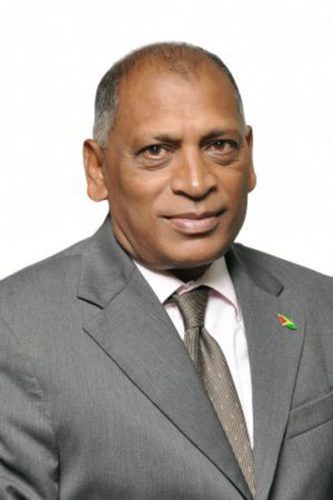Journalist Gordon Moseley has lost the $100 million libel suit he had filed against the Guyana Times and former Minister of Health Dr. Leslie Ramsammy; after a Judge ruled that the statements complained of were fair comment and so protected by that defence.
Moseley’s claim was that Ramsammy—a columnist with the Guyana Times—made certain libelous statements about him which were then published in the newspaper.
He had sued for $100 million in damages for what he said resulted in injury to his reputation and character.
Following Justice Navindra Singh’s ruling yesterday morning, however, the journalist has now been ordered to pay costs in the sum of $500,000 each to Ramsammy and the newspaper no later than November 30th.

The two offending paragraphs written by Ramsammy in his column “Ramsammy’s Ruminations” with which the journalist took issue stated, ‘’Several people in APNU/AFC were the driving force in hijacking the GECOM operations. These people, in APNU/AFC, GECOM and other agencies, like the Police Force and the Media who assisted in contaminating the SOP results must face sanctions and must face such sanctions now … If they succeed with all these machinations and an illegitimate government is installed, then sanctions must be broad against the government, against those who accept Cabinet and MP positions, those who are active participants in the rigging and their families. If the conspiracy to commit electoral fraud is stopped, then those who participated in the attempted heist must be sanctioned, by national laws and international punishments …”
It then continued “given the present assault on democracy in Guyana, in the full view of local and international observers, in the first instance, we will be pursuing sanctions against the following individuals (and their families) who are part of the plot or complicit in rigging the March 2, 2020 Elections in Guyana: Private Sector and Media Gordon Moseley.”
Moseley, (the Claimant) had said that the statements were false, malicious, and defamatory and impugned his character and reputation; while adding that Ramsammy had brought his name into disrepute.
He had contended, too, that neither Ramsammy nor the Times made any attempt at calling before the publication, so that he could exonerate himself.
In their defence, Ramsammy and the Times pleaded, among other things, the defence of fair comment.
Justice Singh who presided over the matter, said that the issue to be determined, was whether the publication was defamatory, and if it was, whether the defence of fair comment could prevail.
Referencing a number of case law authorities in his ruling, the Judge said he did not accept the Claimant’s argument that the words complained of in the first paragraph were defamatory, since the “Court finds that there is no direct or implied reference to the Claimant.”
Regarding the second paragraph, however, the Judge said that that excerpt from the publication is referable to the Claimant.
In referencing the case file before the court, Justice Singh noted in his ruling that Ramsammy’s contention was that Moseley’s reporting of events and his comments were biased in favour of the APNU/AFC coalition, “more particularly, in advancing that the fraudulent results that Guyana Elections Commission (GECOM) was attempting to declare, were in fact accurate and the APNU/AFC coalition had won the Elections.”
It was Ramsammy’s contention that this constituted support by the Claimant of the rigging of the Elections and that he (Moseley), was therefore complicit in the rigging of the Elections; while pointing out that the journalist enjoys a large following on social media and therefore possessed substantial influence over a large section of the public.
Justice Singh said he found that the second paragraph where Moseley is made mention of, is “capable” of being defamatory in nature.
It was his examination of the defence of fair comment pleaded, however, on which the fate of Moseley’s case rested, and which ultimately saw his entire action being thrown out.
Referencing a number of legal authorities, the Judge said that the burden of establishing that a comment falls within the prescribed limits and scope of the defence, lies upon the Defendant who wishes to rely upon the defence, while adding that a Defendant is not entitled to rely on the defence of fair comment if the comment was made maliciously.
The Judge said that also to be considered, were the elements of the defence as applied to the evidence. Against this background the court enquired—was the comment on a matter of public interest? And was the comment recognizable as a comment as distinct from an imputation of fact?
In addressing the first question, the Court said it was indisputable that the commentary made by Ramsammy concerned a matter of national and international interest which surround the events of the Elections of March 2020.
In examining the second question, he noted that counsel for the Claimant had submitted that the commentary itself must contain the facts upon which the opinion is founded, failing which it can only be treated as a statement of fact.
Justice Singh said, however, that he does not accept such a “generalized” statement regarding the defence of fair comment, particularly in the circumstances in which he said the comment was made by Ramsammy.
On this point, the Judge said that the determination must turn in each case on the actual comment/words complained of; while pointing out that in this case, the Court found that the words complained of was “a comment coupled with an allegation of unspecified conduct upon which the comment is based.”
The Judge noted that the circumstances surrounding the Elections had garnered international interest and as a result social media was alight with the developments surrounding the Elections either via news releases or public comments.
He said that the dissemination of information globally by way of the several existing social media platforms cannot be ignored and must be taken into account when considering whether the average reader of Ramsammy’s commentary would have been aware of the underlying facts upon which his comment was based.
“Without a doubt, the nature of the event, to wit, a transparent attempt to rig a national election, had captured the interest of persons globally and they undoubtedly would have been aware of most of the popular reports of the developments surrounding the Elections,” the Judge said.
He then made the point that based on the evidence regarding Moseley’s following on social media it is “highly likely that his reports and comments were widely followed and read.”
Justice Singh said that in the context of the 2020 Elections there can be no doubt that the unspecified conduct of the Claimant, observed and analysed by Ramsammy, can be taken to have been sufficiently known to readers globally, since his postings are widely disseminated.
The Judge said that in this regard, he found that the words written by the Defendant “was a comment based on unspecified conduct but conduct which would have been known and could have been analyzed by the general readership.”
The Court said that it found as a matter of fact that a reasonable person would find the “Claimant’s reporting to be biased and intended to convince the public that the results being released by GECOM were accurate with little or no parallel coverage of the concerns being raised by the public and the international observers over those very results.”
Meanwhile, in assessing “whether the comment was one which could have been made by an honest person, however prejudiced he might be, and however exaggerated or obstinate his views,” Justice Singh said that based on all of the evidence “the answer is undoubtedly in the affirmative.”
He then went on further to find that Ramsammy, who testified that he was a member of the team from the PPP verifying the results being read, could reasonably and honestly have concluded from these postings that “the Claimant was biased in his reporting and therefore giving support to the rigging of the Elections.”
Justice Singh said that despite the submissions by Moseley’s attorney, they produced no evidence that the comment was made maliciously by Ramsammy.
The Court would then go on to further find that the publication complained of by the Claimant was a fair comment as an opinion expressed by the Defendant, that he honestly held at the time of the publication; and therefore the defence of fair comment had been established.
Moseley was represented by attorney Eusi Anderson. Ramsammy and the newspaper were represented by attorneys C.V. Satram and Devindra Kissoon, respectively.




